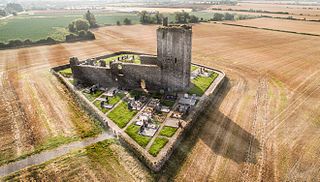Related Research Articles

Athenry is a town in County Galway, Ireland, which lies 25 kilometres (16 mi) east of Galway city. Some of the attractions of the medieval town are its town wall, Athenry Castle, its priory and its 13th century Anglo-Norman street-plan. The town is also well known by virtue of the song "The Fields of Athenry".

Shaftesbury Abbey was an abbey that housed nuns in Shaftesbury, Dorset. It was founded in about 888, and dissolved in 1539 during the English Reformation by the order of Thomas Cromwell, minister to King Henry VIII. At the time it was the second-wealthiest nunnery in England, behind only Syon Abbey.

Baron Athenry is one of the oldest titles in the Peerage of Ireland, but the date of its creation is thoroughly uncertain; each of the first four Berminghams listed below is claimed by some writers to have been Lord Athenry, but the evidence is disputed. The title appears to have been given to the de Birmingham family of Birmingham, Warks, England as a reward for their help in the Norman invasion of Ireland in 1172. Both Sir William de Birmingham, and his son Robert de Birmingham, are variously claimed to have been involved in the invasion, but it is probable that, after the invasion, William returned to his home in England and left Robert their new lands in Ireland.
Pierre de Tarentaise, also known as Peter of Tarentaise was a French Catholic Cistercian who served as the Archbishop of Tarentaise from 1141 until his death.
Rickard de Bermingham, otherwise Rickard Mac Fheorais, was Anglo-Irish lord of Athenry.

Bermingham is the Gaelicised version of 'de Birmingham' and is descended from the family of Warwickshire, England. The Irish version of the name MacFeorais/MacPheorais is derived from Pierce de Bermingham. The first recorded Bermingham in Ireland, Robert de Bermingham accompanied Richard de Clare or 'Strongbow' in Henry II's conquest of Ireland in 1172. On arrival he received: "an ancient monument, valued at 200 pounds, on which was represented in brass the landing of the first ancestor of the family of Birmingham in Ireland."
John de Bermingham, 1st and last Earl of Louth was an Irish peer. He was the commander of the Anglo-Irish army in the Battle of Faughart, the decisive battle in the Irish Bruce Wars 1315–1318. In this battle, Edward Bruce was killed, and Bermingham had Bruce's severed head 'salted in a chest' and transported to England to be put on display before Edward II. He was briefly Viceroy of Ireland in 1321.
Meyler de Bermingham was an Anglo-Irish lord, founder of Athenry.
Basilia de Bermingham, fl. 1250?, religious patron and ancestor of the family Mac Jordan of Connacht.
Peter de Bermingham was the Anglo-Irish second lord of Athenry who died c. 1309.
Thomas de Bermingham was an Anglo-Irish lord who died in 1375.
Walter de Bermingham was an Anglo-Irish lord who died in 1428.
Thomas II de Bermingham was an Anglo-Irish lord who died in 1473.
Thomas Bermingham, 1st Earl of Louth was an Anglo-Irish politician and peer. He was also the last man to be summoned to parliament as Baron Athenry.

Francis de Bermingham, 14th Baron Athenry, was an Anglo-Irish peer.
Orla of Kilcreevanty was an Arroasian Abbess.

There are numerous Bermingham monuments in Ireland particularly in counties Kildare, Offaly, Galway, and Dublin. Most are now in a poor state. Athenry Castle in Galway has been restored, using building techniques similar to those employed when it was originally built.
Annie Philomena Lee is an Irish woman whose life was chronicled in the 2009 book The Lost Child of Philomena Lee by Martin Sixsmith. The book was made into a film titled Philomena (2013), which was nominated for four Academy Awards, including Best Actress for Judi Dench's portrayal of Philomena, and Best Picture.

Baldongan Church, also called Baldungan Castle, is an ancient ruined church and National Monument near Skerries, County Dublin, Ireland.

The Priory Church of Saint Peter and Saint Paul, Athenry, also called Athenry Priory, is a medieval Dominican priory and National Monument located in Athenry, Ireland.
References
- "Annals of the Four Masters". University College Cork . Retrieved 24 October 2014.CS1 maint: discouraged parameter (link)
- Pastor, Ludwig Freiherr von (1898). "The history of the popes, from the close of the Middle Ages". London: Routledge and K. Paul. pp. 7, 53. Retrieved 24 October 2014.CS1 maint: discouraged parameter (link)
- MacLysaght, Edward (1978). The Surnames of Ireland.CS1 maint: discouraged parameter (link)
| Preceded by Stephen de Fulbourn | Archbishop of Tuam 1288-1312 | Succeeded by Máel Sechlain Mac Áeda |